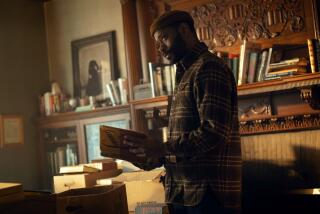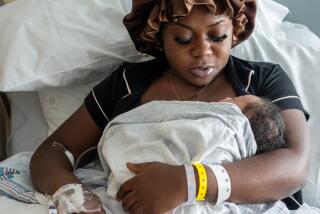Parental Trauma : Baby Mix-Up: A Struggle for New Bonding
- Share via
Rosetta Kirks had learned what each cry meant during the first month she held, cooed over and cuddled the infant she thought was hers. And new mother Firdowsa Ahmed Maillet knew just how to cradle her baby to her bosom so that he would sleep peacefully.
Now, they must learn these things all over again--with different baby boys.
Kirks and Maillet were sent home with the wrong babies--each other’s baby--when they left the maternity ward at Kaiser Permanente Hospital in West Los Angeles last month. The mistake was revealed on March 10, after each mother had spent 26 days nurturing the other woman’s child.
Mix-Up Corrected
Once the hospital had sorted out the mix-up, Rosetta was reunited with the real Nicholas, and Firdowsa with the real Wasim. Some of the anxiety and doubt was gone, but new anxieties and doubts have arisen as each mother struggles to welcome one baby while grieving for the other.
“When he (the first baby) cried, she would get up, no matter how tired or if she was in pain,” Firdowsa’s husband, Nicholas Maillet, said. “When he (Wasim) cries, she will hold him, but she is dreaming of the other one. The first love and the second love, it is not the same.”
Rosetta Kirks said her Nicholas, in his first few days home “just knew” that she was not the same mother he had been with.
“Every time I held him, he cried,” she said.
“He would cry and I’d have to give him right back up,” Kirks said. “He wouldn’t let me hold him. I couldn’t even hold my own baby. I didn’t feel too good about that. It kind of hurt.”
Firdowsa Maillet breast-fed the baby she thought was hers. Now, she finds that her Wasim, who was bottle-fed by Kirks, does not like being breast-fed. It is frustrating for her.
“When I try to breast-feed him, he cries. I am always reminded of the other baby. He used to sleep on my chest. This one won’t,” she said. “I am trying to know this baby, but I am confused.”
The Maillet son’s name, Wasim, is Arabic for “handsome.”
Firdowsa and Nicholas Maillet are Ethiopian. They speak Amharic to each other, and some of their comments in an interview at their home were interpreted through a friend, Meshesha Biru, who is a legal assistant to the Maillets’ attorney.
Biru said the Islamic religion that the Maillets practice holds that if a woman breast-feeds a baby, that baby is her child forever.
“That’s the hardest part,” Biru said. “Even if the hospital tells her the baby is not from her womb, her religion tells her it is her son. They can tell her it was a switch, but it means little.”
Because such baby mix-ups are rare, there is no body of research on what the long-term effects may be. Most experts agree that the parents and, to a lesser degree, the babies will go through a difficult--but not impossible--readjustment.
The normal development of the babies will depend largely on how well their parents adapt, child psychiatrists and specialists say. If the parents love and accept the baby that they end up with, then the child should not suffer permanently.
“There is a jolt to the child but not a terribly significant one. The jolt is to the parent, and if the parents can see themselves through that, then the babies are fine,” said Dr. Michael Durfee, coordinator of the Child Abuse Prevention Program for the county’s Department of Health Services.
Feelings of anger, despair and confusion would be expected in this situation, the experts say. A woman enjoys the euphoria of having brought a new child into the world, then is traumatized when she is told the baby is not hers.
Learn to Understand Cries
“You are looking at that baby with such total awe and wonder, and it’s quite a thing to be told suddenly that all of this (emotion) was distributed in the wrong place,” said Dr. Jeree Pawl, director of the infant-parent program at UC San Francisco.
In their initial weeks, during what amounts to near-round-the-clock care, experts say new parents begin to figure out what their baby’s cries mean, how to soothe the child, and how he or she likes to be held.
Much of what is called “bonding,” experts say, is nonverbal. It is the forming of an attachment based on smells, tone of voice, body rhythms, touch. It comes at feeding and bath time, or when diapers are changed.
Even in just one month, the baby becomes accustomed to his mother or father based on these nonverbal, often instinctual signals.
To a baby, “adults aren’t interchangeable. Even by one month, the baby is going to recognize the person caring for him,” Pawl said. “They’ll know something is different.”
Kirks described her efforts to start over. She said she must buy new baby clothes because the other baby was smaller. And she must divine what her baby wants when he cries.
“I had learned his (the first baby’s) ways, what he wanted when he cried. When he was wet. When he was hungry. When he just wanted someone to pay him some attention,” Kirks said.
“Now we have to learn this baby’s cries,” she said. Nicholas, dressed in a striped jumpsuit and white shoes with bells, sucked on a bottle as his mother spoke.
Album of Memories
As soon as she got home from giving birth at the hospital on Feb. 11, Kirks and her relatives had started to fill a white, leather-bound album with baby’s firsts. “Baby’s first little smile” was at four days. “Baby’s little hand first reached” for a bottle at five days.
Now, the rest of the scrapbook remains blank. Kirks said she will buy another book for Nicholas, but she is sad that she missed his “firsts.”
Nicholas Maillet said their baby looks upward every time they hold him as though he were “trying to find a familiar face.”
“We are new for him,” he said.
“We haven’t adjusted to each other yet,” Firdowsa Maillet said, adding that her mother, who is visiting from Ethiopia--and who arrived after the rightful baby was restored to the Maillets--seems to have better luck in caring for the child.
“It takes time,” Firdowsa Maillet said tearfully. “In the future I will love him. He is my blood, I love him. But it is difficult to forget that one (the other baby).”
The incident has left the Maillets with nagging doubts. They even began to wonder, briefly, about the parentage of their other child, a 14-month-old daughter named Nina.
“After 3 1/2 weeks they came and told me, ‘This is your baby.’ I never saw him before. Why can I believe it?” Firdowsa Maillet asked.
Kirks also has a 6-year-old daughter, Ralisha, who she said noticed the change in the baby but accepted the second one eagerly. However, she said, the adjustment for the baby’s father, Tommy Milligan, has been slow and painful. Kirks said Milligan, who was working at the time of the interview, remained distant at first, afraid of forming--again--an emotional attachment that might only be severed.
“It took Tommy a while to adjust,” she said. “He didn’t want to get too close. He only just started playing with him a couple of days ago. He was worse than I was.”
The Maillets and the Kirks-Milligan couple live barely five miles apart. But their cultures seem to put a greater distance between them.
Rosetta Kirks, 30, came to Los Angeles--”the land of opportunity,” as she put it--2 1/2 years ago from the Mississippi Delta town of Ittabena. She hoped to find work. Instead, she met Tommy Milligan, a manager at a hardware store 17 years her senior, at a nightclub. They started going out, and soon she was pregnant.
They live in a home on a quiet street of small but neat, lower-middle-class houses in Inglewood.
Firdowsa Maillet, 26, married Nicholas Maillet, 34, in Cairo three years ago. She was from Addis Ababa, the Ethiopian capital, and he was born in France of Ethiopian parents. He had already lived in Los Angeles for a couple of years, and she agreed to join him; they took up residence in a two-bedroom apartment at a well-kept complex in the Crenshaw district, ensconced in a small enclave of Ethiopian immigrants.
Nicholas Maillet, who speaks more than half a dozen languages, is an accountant at UCLA.
The two mothers went to Kaiser Permanente on Cadillac Avenue, one of 10 Kaiser branches in Southern California, to have their babies.
Same Feb. 11 Birth Date
Both women gave birth on Feb. 11. Biru, the Maillets’ friend, is convinced the switch took place that very day. He said the wrong baby was brought to Firdowsa Maillet from the first time she saw him, about six hours after delivery.
Kaiser, where about 170 babies are born each month, is conducting an internal investigation to determine how the switch happened. It was the first time in the hospital’s 15-year history that such a mix-up was detected, hospital spokeswoman Michelle Sorey said.
Under hospital policy, at checkout time nurse and parent are supposed to verify the wrist and ankle bands that babies wear for identification.
Kirks said those procedures were not followed and a nurse seemed impatient and hurried when she was checked out. Both couples say they did not notice the content of the wrist bands and put them away as soon as they got home from the hospital.
Only when Rosetta Kirks took out the ID bracelet for some paper work three weeks after coming home from the hospital did she notice that the name on the ID was Maillet--not Kirks. Then, photographs that had been taken in the delivery room came back from being developed, and she could see the baby looked different.
Mentioned Differences
Kirks and Milligan mentioned the differences to a nurse when they took the baby back to Kaiser for a regular checkup. Measurements were taken of the baby, and he came in 4 pounds lighter and 3 inches shorter than what was recorded on his birth certificate.
The hospital administration was alerted, the Maillets were called in and blood and genetic tests conducted. The blood test results confirmed that the babies had been switched, according to a hospital spokesman. The DNA tests will be ready later this month.
While the families have not become intimately friendly, they have agreed to hold a joint first-birthday party.
“You can’t help but think about the other baby,” Kirks said. “You just wonder how he is doing. . . . It’s going to take time, but we are going to make it.”
Kirks and Maillet have seen each other, and their former babies, just once since the reunions took place. It was during the taping of a television talk show at a studio.
Firdowsa Maillet held Rosetta Kirks’ baby, and burst into tears.
More to Read
Sign up for Essential California
The most important California stories and recommendations in your inbox every morning.
You may occasionally receive promotional content from the Los Angeles Times.














